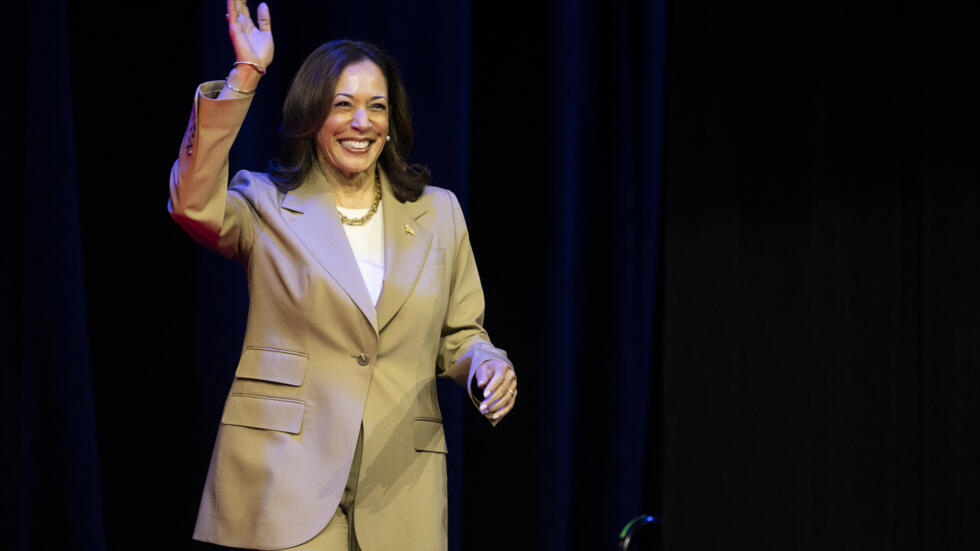Kamala Harris Speaks for the First Time After Biden’s Endorsment
22.07.2024 18:46 1 min. read Alexander Stefanov
Yesterday, the current president of the United States, Joe Biden, withdrew from the 2024 presidential race.
After announcing that he won’t go after re-election, Biden proclaimed his endorsment of vice-president Kamala Harris running in his stead.
Biden’s withdrawal was not unexpected, given the democrats’ opinion that he is most likely not fit to continue the election.
At first there were rumours that Biden will not endorse Harris, but in the end she ended up “taking up the torch”.
Harris delivered her remarks at an event celebrating the NCAA championship teams from the 2023-2024 season.
She says that Joe Biden is already recovering since he was recently diagnosed with Covid. She also stated that Biden has done more than any other president.
While she praised Biden’s achievements during his term, she didn’t comment on her endorsment.
President Biden’s withdrawal from the Democratic nomination race has caused significant disruption within his party and in media coverage, but has had minimal impact on Donald Trump’s election prospects.
According to the crypto-based prediction market Polymarket, the odds of Trump winning the election stand at 65%, a slight decrease of 1% since Biden’s announcement.
Similarly, the prediction market PredictIt has adjusted Trump’s odds from 64% on Saturday to 60% on Monday morning.
Watch the livestream here:
-
1
Billionaire Slams Meme Stock Hype and Sounds Alarm on U.S. Fiscal Health
15.06.2025 18:00 2 min. read -
2
Robert Kiyosaki Predicts 2025 “Super-Crash,” Urges Hoarding Gold, Silver, and Bitcoin
23.06.2025 13:31 2 min. read -
3
Billionaire Investor Sees Dollar Crash If Key Support Breaks
18.06.2025 15:00 1 min. read -
4
Nassim Taleb Says Global Trust Is Shifting from the Dollar to Gold
22.06.2025 17:00 1 min. read -
5
Geopolitical Shockwaves Hit Ethereum Hard While Bitcoin Stays Resilient
22.06.2025 16:21 1 min. read
U.S. Bank Advises Clients to Drop These Cryptocurrencies
Anchorage Digital, a federally chartered crypto custody bank, is urging its institutional clients to move away from major stablecoins like USDC, Agora USD (AUSD), and Usual USD (USD0), recommending instead a shift to the Global Dollar (USDG) — a stablecoin issued by Paxos and backed by a consortium that includes Anchorage itself.
Vitalik Buterin Warns Digital ID Projects Could End Pseudonymity
Ethereum co-founder Vitalik Buterin has voiced concerns over the rise of zero-knowledge (ZK) digital identity projects, specifically warning that systems like World — formerly Worldcoin and backed by OpenAI’s Sam Altman — could undermine pseudonymity in the digital world.
What Are the Key Trends in European Consumer Payments for 2024?
A new report by the European Central Bank (ECB) reveals that digital payment methods continue to gain ground across the euro area, though cash remains a vital part of the consumer payment landscape — particularly for small-value transactions and person-to-person (P2P) payments.
History Shows War Panic Selling Hurts Crypto Traders
Geopolitical conflict rattles markets, but history shows panic selling crypto in response is usually the wrong move.
-
1
Billionaire Slams Meme Stock Hype and Sounds Alarm on U.S. Fiscal Health
15.06.2025 18:00 2 min. read -
2
Robert Kiyosaki Predicts 2025 “Super-Crash,” Urges Hoarding Gold, Silver, and Bitcoin
23.06.2025 13:31 2 min. read -
3
Billionaire Investor Sees Dollar Crash If Key Support Breaks
18.06.2025 15:00 1 min. read -
4
Nassim Taleb Says Global Trust Is Shifting from the Dollar to Gold
22.06.2025 17:00 1 min. read -
5
Geopolitical Shockwaves Hit Ethereum Hard While Bitcoin Stays Resilient
22.06.2025 16:21 1 min. read

